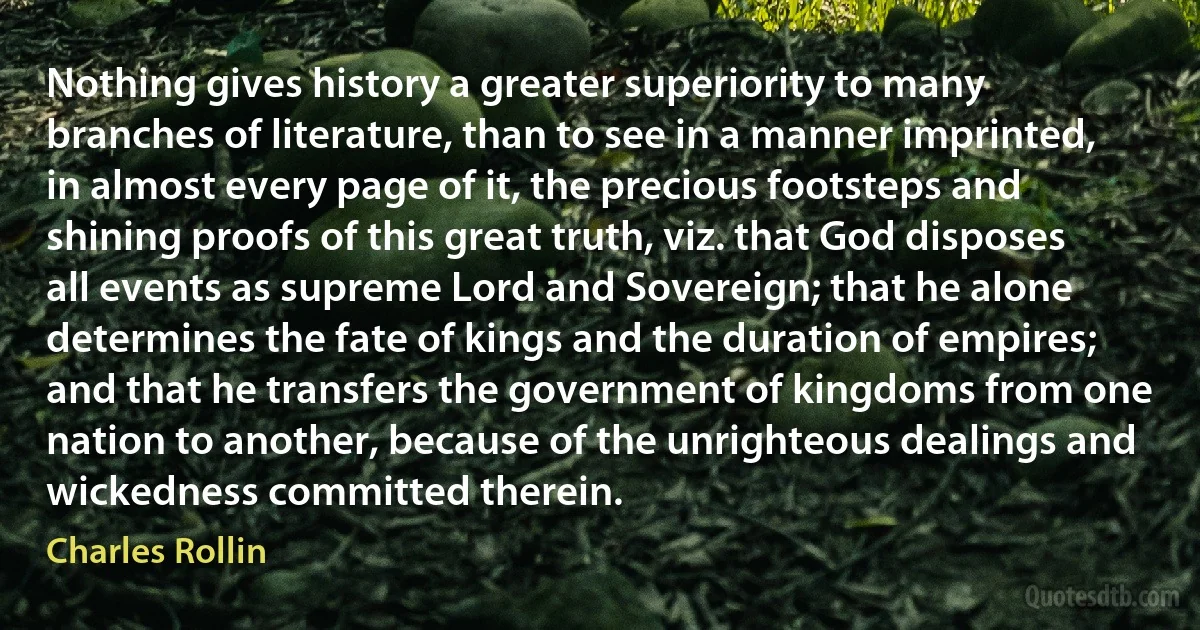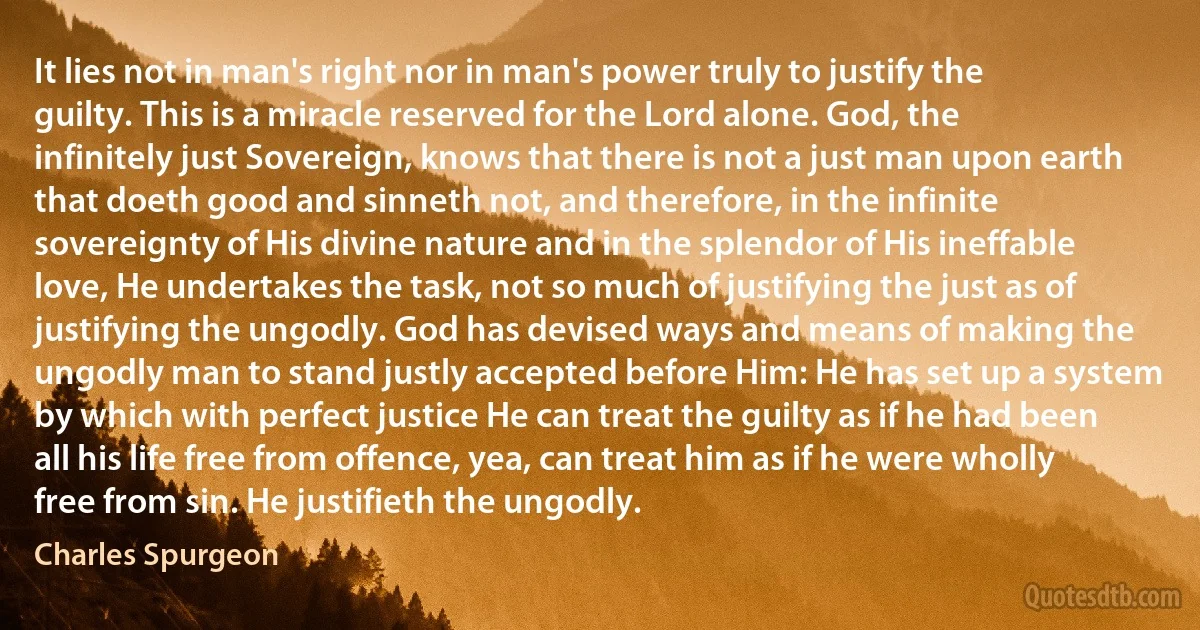Sovereign Quotes - page 6
As verily as God is our Father, so verily God is our Mother; and that shewed He in all, and especially in these sweet words where He saith: I IT AM. That is to say, I IT AM, the Might and the Goodness of the Fatherhood; I IT AM, the Wisdom of the Motherhood; I IT AM, the Light and the Grace that is all blessed Love: I IT AM, the Trinity, I IT AM, the Unity: I am the sovereign Goodness of all manner of things. I am that maketh thee to love: I am that maketh thee to long: I IT AM, the endless fulfilling of all true desires.
For there the soul is highest, noblest, and worthiest, where it is lowest, meekest, and mildest: and of this Substantial Ground we have all our virtues in our Sense-part by gift of Nature, by helping and speeding of Mercy and Grace: without the which we may not profit.

Julian of Norwich
Tobacco, divine, rare, superexcellent tobacco, which goes far beyond all the panaceas, potable gold, and philosopher's stones, a sovereign remedy to all diseases...but as it is commonly abused by most men, which take it as tinkers do ale, 'tis a plague, a mischief, a violent purger of goods, lands, health, hellish, devilish and damned tobacco, the ruin and overthrow of body and soul.

Robert Burton
The root problem is very simply stated: if there were no sovereign independent states, if the states of the civilized world were organized in some sort of federalism as the states of the American Union, for instance, are organized, there would be no international war as we know it. ... The main obstacle is nationalism.

Norman Angell
After the publication of my dialogues, I was summoned to Rome by the Congregation of the holy Office, where, being arrived on the 10th of February 1633, I was subjected to the infinite clemency of that tribunal, and of the Sovereign Pontiff, Urban the Eighth; who, notwithstanding, thought me deserving of his esteem.

Galileo Galilei
It has been said, that the people had already surrendered all their powers to the State sovereignties, and had nothing more to give. But, surely, the question whether they may resume and modify the powers granted to government does not remain to be settled in this country. Much more might the legitimacy of the general government be doubted, had it been created by the States. The powers delegated to the State sovereignties were to be exercised by themselves, not by a distinct and independent sovereignty, created by themselves. To the formation of a league, such as was the confederation, the State sovereignties were certainly competent. But when, "in order to form a more perfect union," it was deemed necessary to change this alliance into an effective government, possessing great and sovereign powers, and acting directly on the people, the necessity of 'referring it to the people, and of deriving its powers directly from them, was felt and acknowledged by all.

John Marshall
It is too true, however disgraceful it may be to human nature, that nations in general will make war whenever they have a prospect of getting anything by it; nay, absolute monarchs will often make war when their nations are to get nothing by it, but for the purposes and objects merely personal, such as thirst for military glory, revenge for personal affronts, ambition, or private compacts to aggrandize or support their particular families or partisans. These and a variety of other motives, which affect only the mind of the sovereign, often lead him to engage in wars not sanctified by justice or the voice and interests of his people.

John Jay
There is a historic battle going on across the west, in Europe, America, and elsewhere. It is globalism against populism. And you may loathe populism, but I'll tell you a funny thing. It is becoming very popular! And it has great benefits. No more financial contributions, no more European Courts of Justice. No more European Common Fisheries Policy, no more being talked down to. No more being bullied, no more Guy Verhofstadt! What's not to like. I know you're going to miss us, I know you want to ban our national flags, but we're going to wave you goodbye, and we'll look forward in the future to working with you as a sovereign nation...

Nigel Farage
We live in and by the law. It makes us what we are: citizens and employees and doctors and spouses and people who own things. It is sword, shield, and menace: we insist on our wage, or refuse to pay our rent, or are forced to forfeit penalties, or are closed up in jail, all in the name of what our abstract and ethereal sovereign, the law, has decreed. And we argue about what it has decreed, even when the books that are supposed to record its commands and directions are silent; we act then as if law had muttered its doom, too low to be heard distinctly. We are subjects of law's empire, liegemen to its methods and ideals, bound in spirit while we debate what we must therefore do.

Ronald Dworkin
I do not believe that this nation, which has maintained and defended its independence for a thousand years, will now submit to see it merged or lost; nor did I become a member of our sovereign Parliament in order to consent to that sovereignty being abated or transferred. Come what may, I cannot and will not.

Enoch Powell
Well, our forefathers abolished this system [of monopolies]; at a time, too, mark you, when the sign manual of the sovereign had somewhat of a divine sanction and challenged superstitious reverence in the minds of the people. And shall we, the descendants of those men, be found so degenerate, so unworthy of the blood that flows in our veins, so recreant to the very name 'Englishman,' as not to shake off this incubus, laid on as it is by a body of our fellow-citizens? ... We advocate the abolition of the Corn Law because we believe that to be the foster-parent of all other monopolies; and if we destroy that-the parent, the monster monopoly-it will save us the trouble of devouring the rest.

Richard Cobden
The Sovereign can only act by advisers, and through the instrumentality of those who are neither infallible nor impeccable- answerable, indeed, for all that the irresponsible Sovereign may do, but liable to err through undue influence, and to be swayed by improper motives.

Henry Brougham, 1st Baron Brougham and Vaux
If ever there was a hard-headed and not a soft-hearted Sovereign it was she; if ever there was a place where there was little of that romantic sentiment of going abroad to do right and justice to other people, I think it was in that Tudor breast of our 'Good Queen Bess,' as well call her. ... When I see the accounts of what passed when the [Dutch] envoys came to Queen Elizabeth and asked for aid, how she is huckstering for money while they are begging for help to their religion,-I declare that, with all my principles of non-intervention, I am almost ashamed of old Queen Bess. And then there were Burleigh, Walsingham, and the rest, who were, if possible, harder and more difficult to deal with than their mistress. Why, they carried out in its unvarnished selfishness a national British policy; they had no other idea of a policy but a national British policy, and they carried it out with a degree of selfishness amounting to downright avarice.

Richard Cobden


![He says to the Sovereign: "I no longer am leader of the majority party in the House of Commons; but I am carrying on as your Prime Minister." Now I don't think anyone can say that-at least without inflicting damage on the constitution... [it is] tantamount to treating the monarch herself with disrespect and denying the very principle on which our parliamentary democracy is founded. (Enoch Powell)](https://cdn.quotesdtb.com/img/quotes_images_webp/49/enoch-powell-anyone-carrying-313049.webp)
